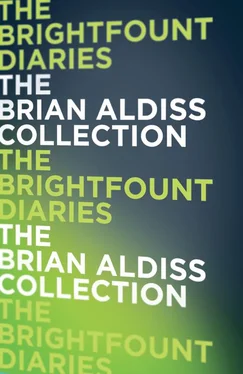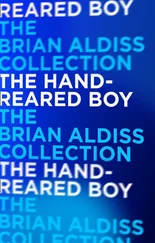BRIAN ALDISS
The Brightfount Diaries
For my dear ‘Polly’
You are the music while the music lasts
About half of this material originally appeared in the pages of The Bookseller . For permission to reproduce it here – and for many other kindnesses – I am indebted to the Editor, Mr Edmond Segrave.
Table of Contents
Title Page BRIAN ALDISS The Brightfount Diaries
Dedication For my dear ‘Polly’ You are the music while the music lasts
Epigraph About half of this material originally appeared in the pages of The Bookseller . For permission to reproduce it here – and for many other kindnesses – I am indebted to the Editor, Mr Edmond Segrave.
Introduction Introduction This is my pet book – the book with which I first dipped my toes into the chilly waters of publication. Some time after WW2 was over, I returned from the East seeking the grant I would need in order to attend university. I was eventually told that the ex-service grant system was closed. So, I took an ill-paid job in an Oxford bookshop. At least I was to be among books, those friendly fruits. The official magazine of the book trade was, and still is, The Bookseller . Weekly copies were circulated among the staff. In the fifties, articles were published about the ‘big cheeses’ who comprised the book trade. There was no mention of those slaves, like me, who actually manned the counters and faced the customers. I wrote a letter about this state of affairs to the editor of The Bookseller , a Mr Edmond Segrave, saying that ‘the pale face of the bookseller’s assistant was the backbone of English literature.’ Mr Segrave enjoyed the joke and dropped me a line in return. It was then that I conceived the idea for a series of comic sketches set in an imaginary bookshop. Mr Segrave summoned me to his office. I wore a tie for the occasion. He said they had never published, never tried to publish, a comic series. If I would write six of these proposed pieces, he would consider them to see if he found them funny. So, that I did. I worked near the celebrated Oxford bookseller, ‘Blackwell’. So, playing on this, I chose the name for my fictitious shop: Brightfount’s. Those weekly instalments began to appear in The Bookseller . Publishers, it was reported, were amused. ‘Brightfount’s’ had been appearing regularly for about two years when I received a letter from Mr Charles Monteith of Faber and Faber. He asked if I would care to turn my weekly column into a book. During the next six months, six other publishers wrote to me with similar proposals. But I could not have had a better publisher than Faber, nor had a more pleasant man to deal with than Monteith. He and I had two items in common; both of us as boys had subscribed to Modern Boy , (which published original ‘Biggles’ stories), and both of us had served in Burma, fighting Japanese forces. I have always been confident. But about two weeks before The Brightfount Diaries ’ publication day, I suffered the equivalent of stage fright. The public! – What if they don’t laugh? Fortunately, they did. My long shambles of a career had begun. Brian Aldiss Oxford, 2012
June
June–July
July
August
August–September
September
September–October
October
November
November–December
December
About the Author
Copyright
About the Publisher
This is my pet book – the book with which I first dipped my toes into the chilly waters of publication.
Some time after WW2 was over, I returned from the East seeking the grant I would need in order to attend university. I was eventually told that the ex-service grant system was closed.
So, I took an ill-paid job in an Oxford bookshop. At least I was to be among books, those friendly fruits.
The official magazine of the book trade was, and still is, The Bookseller . Weekly copies were circulated among the staff. In the fifties, articles were published about the ‘big cheeses’ who comprised the book trade. There was no mention of those slaves, like me, who actually manned the counters and faced the customers.
I wrote a letter about this state of affairs to the editor of The Bookseller , a Mr Edmond Segrave, saying that ‘the pale face of the bookseller’s assistant was the backbone of English literature.’
Mr Segrave enjoyed the joke and dropped me a line in return. It was then that I conceived the idea for a series of comic sketches set in an imaginary bookshop.
Mr Segrave summoned me to his office. I wore a tie for the occasion. He said they had never published, never tried to publish, a comic series. If I would write six of these proposed pieces, he would consider them to see if he found them funny.
So, that I did. I worked near the celebrated Oxford bookseller, ‘Blackwell’. So, playing on this, I chose the name for my fictitious shop: Brightfount’s.
Those weekly instalments began to appear in The Bookseller . Publishers, it was reported, were amused.
‘Brightfount’s’ had been appearing regularly for about two years when I received a letter from Mr Charles Monteith of Faber and Faber. He asked if I would care to turn my weekly column into a book.
During the next six months, six other publishers wrote to me with similar proposals. But I could not have had a better publisher than Faber, nor had a more pleasant man to deal with than Monteith. He and I had two items in common; both of us as boys had subscribed to Modern Boy , (which published original ‘Biggles’ stories), and both of us had served in Burma, fighting Japanese forces.
I have always been confident. But about two weeks before The Brightfount Diaries ’ publication day, I suffered the equivalent of stage fright. The public! – What if they don’t laugh?
Fortunately, they did. My long shambles of a career had begun.
Brian Aldiss
Oxford, 2012
SUNDAY
Last week at ‘Hatchways’. Shall be sorry to leave here, partly for Aunt Anne’s sake – she is becoming afraid of being left with Uncle Leo – and partly because I shall miss the country. Shall even miss that seven mile cycle in to work each morning, which I have cursed so often.
Been glorious day. Just looked out of my window to see, low over Claw Marsh, sun setting behind Drabthorpe Priory, while down on the lawn Uncle Leo stood knee deep in the fish pond.
‘Whatever are you doing there?’ I called in some alarm.
‘I hope I have not warped the course of your life too much,’ he bellowed back. ‘You must remember I have had to sacrifice a lot for your mother; she has been a difficult woman, Derek, a difficult woman – always remember that.’
‘This is Peter up here,’ I called back, not without embarrassment, remembering Colonel Howells next door was probably within earshot. ‘What are you doing?’
He climbed slowly out of the water, shouting as he did so, ‘I’m just considering erecting some tessellation instead of that parapet; it would just break the line of the roof nicely. Come down here and see.’
‘Not if it means standing in the middle of the fish pond.’
Nevertheless went down. Uncle was standing there wringing out his trousers. Asked him cautiously what made him call me Derek.
‘Got the boy on my mind, you know, with him coming back to England soon,’ he explained. ‘Shouldn’t be turning you out otherwise.’ Then he rapidly changed subject and said, ‘You work in a bookshop. Bring me back any books on tessellation you have.’
Can’t remember single book on tessellation at Brightfount’s, but Uncle must be humoured. My cousin Derek and his wife Myra and her sister Sheila are all descending on Uncle and Aunt, to live at ‘Hatchways’ until they can find house of their own. No doubt prospect makes him feel a little odd.
Читать дальше












